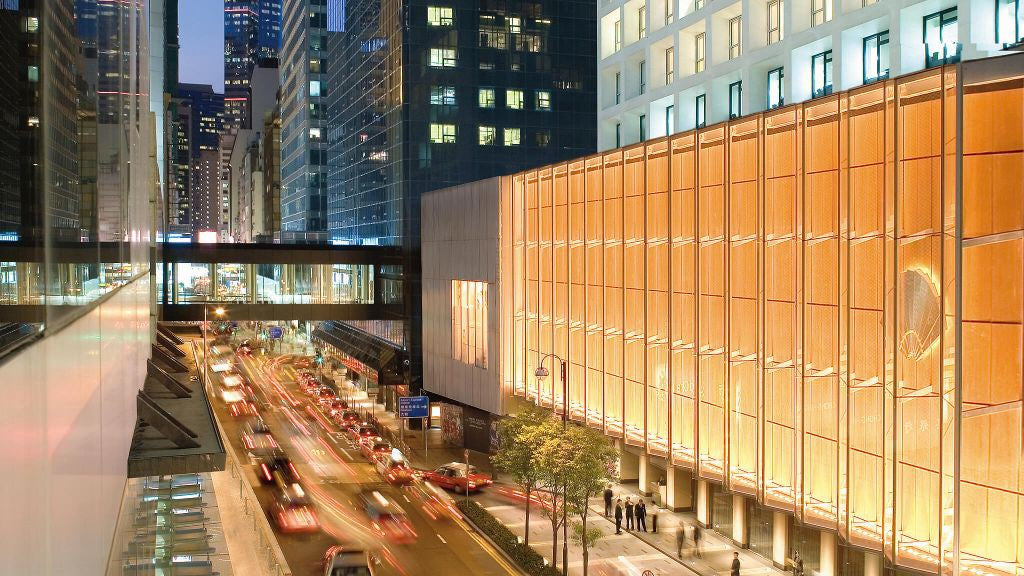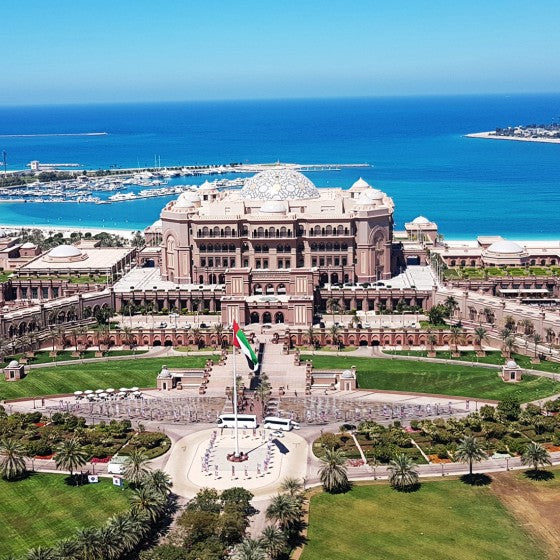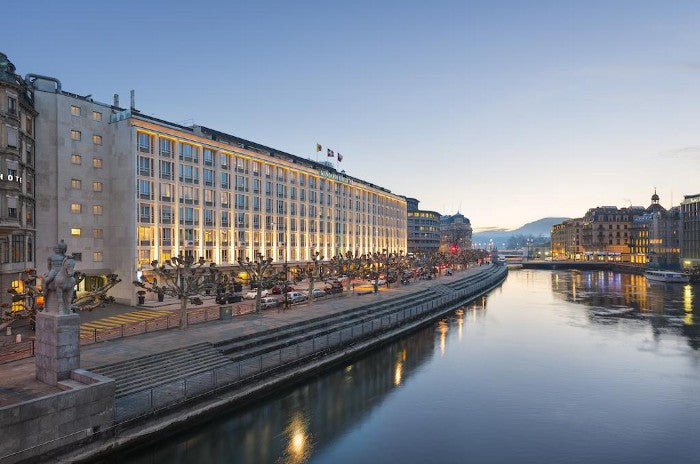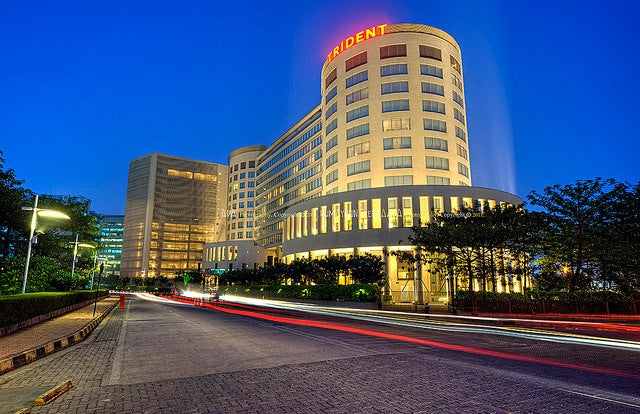
- After entering and ruling oil and gas, petrochemicals, telecom, digital services, media & entertainment and retail sectors, Reliance Industries (RIL) is now stepping into hospitality through a JV with Mumbai-based real estate company Maker Builders. They will build two new hotels at the Bandra Kurla Complex in suburban locale. One is a five star and another is a seven star.
- RIL already holds majority stake 33.43% in EIH Group ( Owner of 33 Oberoi Brand Luxury Hotel Properties across 8 countries, 10 Five Star Trident Brand Properties across 7 states in India, One Maiden Brand Five Star Hotel Property in Delhi). EIH Group also works with 31 Mandarin Hotel Associate Brand Properties. Oberoi Group holds 32.11% in EIH.
- EIH sets ambitious target of 100 properties each for the 3 brands (Oberoi, Trident, Maiden) across the world within next 3 years.
UK Stoke Park Acquisition
 |
 |
 |
 |
- To further boost our consumer and hospitality assets we have bought Stoke Park Ltd. for $79 million.
- The epic duel between James Bond and Auric Goldfinger is still among the most fierce game of golf in cinematic history.
- Fifty years later, the setting of that golf green in Stoke Park has barely changed. But its ownership has.
- The iconic venue — an intrinsic part of blue blooded Britain — & its uber luxury spa, hotel, golf course and country club is spread across 300 acres in Buckinghamshire.
- RIL has acquired it through an international arm, from the International Group (IG), owned by the King family, a second-generation UK family business, for around 60 million pounds ($79 Mn / Rs 600 cr).
- The golf club attracts the global jet setters from business, movies, politics and royalty & is a trophy asset to own.
- After Singapore and Dubai, the UK and especially London has been the chosen outpost of several well heeled Indians like Sunil Mittal, the Hinduja family, Lakhshmi Mittal, Analjit Singh, Anil Agarwal, Ajay Piramal among several others.
- The Ambani family spent the summer of 2020 at Heckfield Place, a famous Georgian family home in Hampshire, restored from its classical origins to a luxury hotel over 400 acres, with a posse of family and friends.
- The King family has been looking to sell this 49 bedroom marque property for the last several years and had even mandated CBRE in 2018 to bring the property to the market having explored the possibility of a sale two years prior.
- In 2016 Donald Trump was interested in buying the estate.
- UK is a preferred location and this acquisition is likely to be used by the corporate entity only.
- Originally designed by Capability Brown and Humphry Repton, it was initially built as a private home by George III’s architect James Wyatt between 1790 and 1813.
- Since then it has become a popular movie location — Tomorrow Never Dies, Layer Cake, Bridget Jones Diary and celebrity concert venue where Elton John performed outdoors in 2014, for a charity concert for SportsAid, patronised by the Duchess of Cambridge, and raised $1.24 million It also hosts the annual Boodles Tennis Championships as a warm-up to Wimbledon, a week prior to the Championships.
- The King family is currently manned by brothers Hertford (54), Witney (53), and Chester (49) after their father Roger King, a maverick dealmaker, who set it up in the UK in 1964. After starting out as a jeweller, he went to become the worldwide distributor for the Soviet Union’s polished diamonds. Following his close proximity to Sheik Suroor bin Mohammed Al Nahyan, a member of the Abu Dhabi Royal family, on account of real estate deals, King diversified into running hospitals in Abu Dhabi and Saudi Arabia in the late 1970s.
- International Hospitals Group (IHG) has since then completed over 450 projects in 49 countries around the world for private and public sector clients, including 22 national governments, the United Nations, the World Bank, and the International Monetary Fund.
- Today IG is spread across six business lines, including E Sports, healthcare and wellness, clubs, luxury brand development among others. Stoke Park is their crown jewel.
- Reliance has also spread its wings in the UK. Reliance Brands, a subsidiary of RIL, acquired struggling, 270 year old British toy retailer Hamleys for about Rs 620 crore (GBP 67.96 million) in an all-cash deal in 2019–20. It also has JVs with leading UK companies like retailer Marks and Spencer and BP.
Reliance buys luxury hotel Mandarin Oriental in New York for $98.15 mn
- Mandarin Oriental New York is an iconic luxury hotel located at 80 Columbus Circle, directly adjacent to the pristine Central Park and Columbus Circle.
- Set up in 2003, Mandarin Oriental New York is an iconic luxury hotel located at 80 Columbus Circle, directly adjacent to the pristine Central Park and Columbus Circle.
- Reliance Industrial Investments and Holdings Limited (RIIHL), a wholly-owned subsidiary of Reliance Industries Limited (RIL), has today, entered into an agreement to acquire the entire issued share capital of Columbus Centre Corporation (Cayman), a company incorporated in the Cayman Islands and the indirect owner of a 73.37 per cent stake in Mandarin Oriental New York, one of the premium luxury hotels in New York City for an equity consideration of approximately USD 98.15 million.
- This is the second acquisition of an iconic hotel by Reliance in less than a year.
- Mandarin Oriental New York has global recognition and has won several influential awards, including AAA Five Diamond Hotel, Forbes Five Star Hotel, and Forbes Five Star Spa, among others. It had revenues of $115 million in 2018, $113 million in 2019 and $15 million in 2020.
- This acquisition will add to the consumer and hospitality footprint of the group. The group already has investments in EIH Ltd (Oberoi Hotels), Stoke Park Limited in the UK and is developing a state-of-the-art convention centre, hotel and managed residences in BKC Mumbai.
- The closing of the transaction is anticipated to occur by the end of March 2022 and is subject to certain customary regulatory and other approvals and the satisfaction of certain other conditions.
- In the event that the other owners of the hotel elect to participate in the sale transaction, RIIHL would acquire the remaining 26.63 per cent, based on the same valuation used for the acquisition of the indirect 73.37 per cent stake.
- RIIHL had in April last year announced the acquisition of the entire issued share capital of Stoke Park Limited, a company incorporated in the United Kingdom, for 57 million pounds. The facilities include a hotel, conference facilities, sports facilities and one of the highest-rated golf courses in Europe.
- Reliance currently has investments in EIH Ltd apart from developing convention centres, hotels and managed residences in Mumbai.
Oberoi luxury resort to be named after Mukesh Ambani’s son Anant
- A real estate corridor in Mumbai’s Bandra Kurla Complex (BKC), owned and operated by Reliance Industries (RIL) and the Maker Group, is not going to get an international hospitality brand like the Nevada-based MGM Resorts International, which runs such super premium resort hotels as the Bellagio and the MGM Grand in Las Vegas. Instead, it will get a luxury resort hotel by the Oberoi Group. And according to sources, the hotel, which is going to be Oberoi’s first urban resort, will be called Anantvilas — after Anant Ambani, younger son of RIL Chairman, Mukesh Ambani.
- The partners are in final talks with an international hotel chain listed in London — Mandarin Oriental of Jardine Matheson group — to run their hotels. Terms and conditions of a revenue sharing deal between RIL, Maker and Mandarin are expected to signed shortly. The first project — Maker Maxity — will come up in the open-air theatre ground in Bandra.
- Reliance and Maker will hold 35 per cent stake each in the project, while Urban Infrastructure Venture Capital Fund and Zander Private Equity Fund will hold 15 per cent each. One hotel will be a five-star property and other will be a seven-star super luxury hotel and Mandarin will manage both.
- Mandarin Oriental will oversee construction of both the properties and ensure that they meet the hotel chain’s specifications. Construction of both the hotels is estimated to cost about Rs 1,200 crore, excluding land value of about Rs 3,000 crore. Construction cost will be borne by RIL and Maker Builders.
- According to people close to the negotiations, the business plan and the revenue sharing agreement between Maker Maxity and the hotel chain is in place. “It will take two to three years for the project to be set up.”
- Though RIL has not lined up any other hotel projects, it may look at setting up more hotels in other cities. If there is good revenue generation from the business, the company may have more such properties.
- Mandarin Oriental is an international hotel investment and management group that operates, or has under development, 41 properties representing more than 10,000 rooms in 26 countries, with 17 hotels in Asia, 13 in the US and 11 in Europe, the Gulf, and North Africa. Its parent, Mandarin Oriental International, is incorporated in Bermuda and has its primary share listing in London and secondary listings in Bermuda and Singapore. Mandarin Oriental Hotel Group International, which operates from Hong Kong, manages the group’s hotels.
EIH Investment — Reliance Industries to team up with EIH for developing hotels
- Within a year of foraying into the high growth hospitality sector, RIL will team up with EIH Ltd to set up hotels in India at an estimated investment of Rs 700 crore.
- In all probability RIL will develop the Bangalore and Goa projects in association EIH.
- EIH operates hotels and resorts under Oberoi and Trident brands. Oberoi family has 32.11% stake in EIH.
- RIL has 18.53% stake in EIH and is acquiring a 14.9% stake in EIH from ITC without triggering an open offer increaing its stake to 33.43 %.
- The Securities and Exchange Board of India (SEBI) has however raised the threshold trigger for offers from 15 per cent to 25 per cent.
- The proposed joint hotel projects in Bangalore would have 250 rooms, the one in Goa will have 100 rooms and both will be managed by EIH.
- EIH has land in both locations…8.2 acre in Bangalore and 55 acre in Goa.
- Currently, each room costs Rs two crore for Oberoi brand hotels without land.
- The combined investment for both properties is estimated to be around Rs 700 crore.
OBEROI PROPERTIES — 33
INDIA PROPERTIES — 13 ( 3 more coming up )













EGYPT PROPERTIES — 3



INDONESIA PROPERTIES-2


MAURITIUS PROPERTIES — 1

MOROCCO PROPERTIES — 1

SAUDI ARABIA PROPERTIES — 1

UAE PROPERTIES-2


OUR ALLIANCE PARTNER — MANDARIN ORIENTAL PROPERTIES — 31
Asia-Pacific — 13
- The Landmark Mandarin Oriental, Hong Kong

- Mandarin Oriental, Hong Kong

- Mandarin Oriental, Singapore

- Mandarin Oriental, Bangkok

- Mandarin Oriental Wangfujing, Beijing

- Mandarin Oriental, Guangzhou

- Mandarin Oriental, Jakarta

- Mandarin Oriental, Kuala Lumpur

- Mandarin Oriental, Macau

- Mandarin Oriental, Sanya

- Mandarin Oriental Pudong, Shanghai

- Mandarin Oriental, Taipei

- Mandarin Oriental, Tokyo

The Americas — 6
- Mandarin Oriental, New York

- Mandarin Oriental, Boston

- Mandarin Oriental, Canouan

- Mandarin Oriental, Miami

- Mandarin Oriental, Santiago

- Mandarin Oriental, Washington D.C.

Europe, Middle East & Africa — 12
- Emirates Palace, Abu Dhabi

- Mandarin Oriental, Barcelona

- Mandarin Oriental, Bodrum

- Mandarin Oriental, Doha

- Mandarin Oriental, Geneva

- Mandarin Oriental, Lago di Como

- Mandarin Oriental Hyde Park, London

- Mandarin Oriental Ritz, Madrid

- Mandarin Oriental, Milan

- Mandarin Oriental, Munich

- Mandarin Oriental, Paris

- Mandarin Oriental, Prague

TRIDENT PROPERTIES










MAIDENS PROPERTIES

Hospitality Market Characteristics
- The hospitality market covers sales of lodging and dining services. The hospitality industry comprises businesses that provide customers with lodging, prepared meals, snacks and beverages for immediate consumption. It includes both accommodation and food service establishments as these two activities are often combined at the same establishment.
Hospitality Market Size
- The Hospitality market is expected to grow at a CAGR of around 8% to nearly $5,891 billion by 2022.
- Growth in the historic period resulted from improved earning capacity, emerging markets growth, travel, and tourism. Going forward, economic growth in developed nations, and technological development will drive growth. Factors that negatively affected growth in the historic period were talent crunch in emerging Asia, online travel agencies (OTAs) increasing power, slow growth in Asia and low customer retention. Factors that could hinder the growth of this market in the future are increasing preference for healthy food options, security concerns, and government regulations.
Some of the major drivers of the market are:
- Economic Growth — The market is expected to benefit from steady economic growth forecast for many developed and developing countries. This continued economic growth is expected to be a driver of the Hospitality market as increasing disposable incomes and greater affluence will allow consumers to increase their spending on recreational activities such as Hospitality.
- Changing Consumer Hospitality Habits — The Hospitality market is expected to be driven by the changing Hospitality habits of consumers. The increasing popularity of Hospitality apps and social Hospitality will propel the growth of the market in the forecast period.
However, the market is expected to face restraints from several factors such as -
- Increasing Preference For Healthy Food Options — With growing health concerns many people globally are turning to eating more healthily. Consumers now are more concerned about how food is raised and prepared and are willing to seek out and pay a little more for something they recognize as healthy.
- Security Concerns — Terrorism has affected tourists’ perceptions with regard to travel and the risks associated with it, so negatively affecting the hospitality industry. In recent years, terrorist acts have targeted tourist sites and places of public interest.
Hospitality Market Competitive Landscape
- The global market for hospitality is highly fragmented. The top ten competitors in the global hospitality market made up around 4% of the total market in 2019. Major players in the market include Compass Group PLC, Marriott International, Starbucks Coffee, Subway, Sodexo, Aramark Corporation, McDonald’s, Hilton Worldwide, Chick-fil-A, Elior Group.
Hospitality Market Segmentation
The hospitality market is segmented by type of product
- By Type of Product- The Hospitality market can be segmented by type into food and beverage services, and non-residential accommodation services.The food and beverage services market accounted for the largest share of the hospitality market in 2019 at around 78%. The non-residential accommodation services market is expected to be the fastest-growing segment.
- By Geography- The Hospitality market is segmented into Asia Pacific, Western Europe, Eastern Europe, North America, South America, Middle East and Africa, and China and the USA. Among these regions,Asia-Pacific is the largest market for hospitality market, accounting for around 42% of the global market. It was followed by North America, Western Europe and then the other regions. Going forward, Middle East, and Africa will be the fastest growing regions in this market. This is followed by Eastern Europe, and South America.
Hospitality Market Trends
- Innovative Hotel Design — In the hotel industry guests are looking for more ‘inside the hotel’ experiences. This demand is driving hotel managers to ensure that all parts of their hotels are as welcoming as the lobby. Increased Automation In Hotels — Hotels are using technologies that are transforming the customer experience. Some technologies are leading to significant improvements and savings in the hospitality market. The most significant trends in this market are the use of near field communication (NFC) technology, infrared technologies, and robots.
Potential Opportunities In The Hospitality MarketWith the improved earning capacity, emerging markets growth, travel, and tourism, the potential and scope for the global hospitality market is expected to increase.
Hospitality 2.0 or the role of innovation in the post-covid hospitality industry
- The array of modern technologies that are currently used allowing hospitality businesses to comply with the new standards allowing them to operate and regain trust of the returning customers varies from AI to IoT to Visual Recognition to Robotics to Block Chain and VR.
- In the twenty-first century, the hospitality industry has gone through a substantial transformation with innovative technological solutions. With the rise of awareness of the environmental impact of any industry worldwide, over the past five years the technology has mainly been used to reduce costs, increase efficiency and of course enhance sustainability.
- The array of modern technologies that are currently used allowing hospitality businesses to comply with the new standards allowing them to operate and regain trust of the returning customers varies from Artificial Intelligence (AI) to Internet of Things (IoT) to Visual Recognition to Robotics to Block Chain and Virtual Reality (VR). The most efficient and modern solutions will mix two or more of these technologies in order to provide an innovative service.
- One of the latest technologies gaining ground in the hospitality sector is the visual recognition, a technology solution that has already been used in proptech for keyless entry in buildings and more widely by such companies like Apple for their smartphone unlocking features. This solution has already demonstrated its amazing ability to track the use of face masks and now will allow businesses to offer cashless payments, track users’ movements in buildings and supervise the distance between users.
- Another technology that is becoming increasingly used in hospitality industry is robotics which combined with other technologies such as AI or IoT is a great tool which can not only provide personalised service to customers when necessary but also helps to minimise contact with staff for reasons of social distancing. An example would be providing a self-check in, applying regular customer preferences such as an automatically served cup of tea on arrival or robots like “Connie”, the robot used by Hilton Hotels, the first AI-based robot to be used in a hospitality setting. Connie for when there is no-one at front desk allows for the hotel guests to find answers to either hotel or neighbourhood related questions such as “is there a French restaurant nearby” or “what equipment is available at the hotel gym”.
- Nowadays transparency has become a strong customer demand allowing to feel secure while experiencing services and blockchain is a technology able to produce this transparency. The travel industry relies upon information and sometimes even personal possessions being passed between multiple different companies, for example when it concerns the movement of luggage when travelling.
- At the time of increasingly present travel restrictions, VR becomes a tool allowing for customers to experience services or at least have a preliminary visit of places to avoid multiple travels. While it does not compare to experiencing the service physically, it does allow to experience services in a virtual environment. Hotels have started using this tool for virtual hotel tours and even hospitality education providers use it to allow students to visit school campuses before arrival. As an example, enhancing the experience with a VR headset has been used by Atlantis Dubai Hotel or Les Roches hospitality institute in Switzerland. While it does not compare to experiencing the service physically, it does allow to experience services in a virtual environment.
- If we add Artificial Intelligence including Machine Learning to all previous solutions, new solutions will analyse the collected data from IoT sensors in devices, robots will learn from humans and other robots, visual recognition will provide potential services based on customers experience, VR will enhance experience based on customer satisfaction and blockchain will ensure traceability and transparency. Thus, customer hyper-personalization will arrive at the same level as health security measures.
- It might seem that the evolution of these technologies is a natural response to the ever-growing needs of the modern customer, however, the current safety risks if not properly addressed by hospitality establishments can lead to serious consequences impacting the financial health of the businesses. The current context catalyses the need for more innovative solutions in the industry and while costly to implement can potentially save companies from permanently closing their doors to the customers.
